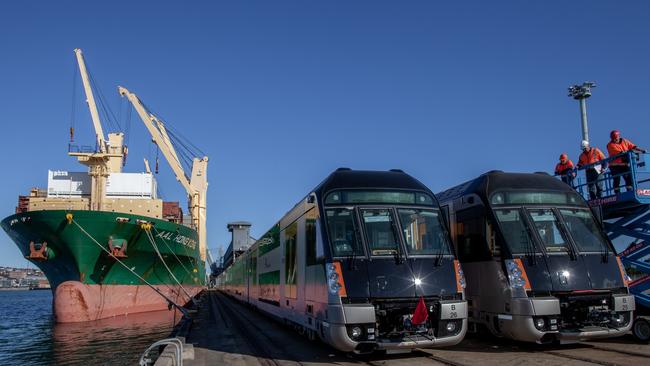ACCC to allow coal miners to band together to negotiate access rights at Port of Newcastle
This is the latest move in the running stoush over charges and investment at the privatised port.

The competition watchdog says it will allow 10 NSW coal companies to collectively negotiate access rights with the Port of Newcastle, in its latest move in the running stoush over charges and investment at the privatised port.
The Australian Competition and Consumer Commission had signalled the move in a draft determination in July, saying it was likely to allow coal miners to band together to negotiate access rights to allow coal miners to band together to negotiate access rights to the China Merchant-dominated port.
On Thursday, the ACCC formalised that decision, clearing the path for coal majors including Glencore, BHP, Yancoal and Whitehaven Coal to collectively negotiate elements of their access rights to the port.
The price the port charges for use of the shipping channel that takes coal to export destinations has been the centre of successive disputes between its owners and coal exporters since it was sold by the NSW government to by a consortium including The Infrastructure Fund and China Merchants Port Holdings for $1.75bn in 2014.
But the ACCC ruling is not just focused on price and charges. It also allows coal miners to put a joint position on a range of other matters, including reinvestment and capital spending at the port, potential productivity trade-offs for hikes in charges, and other “industry wide” considerations.
The decision does not bind the coal companies to taking part in collective negotiations, and does not give them the right to threaten to boycott the port, the ACCC said on Thursday.
The ACCC has been a harsh critic of the Port of Newcastle’s charging regime since it was privatised, arguing the port used its monopoly position to ratchet up charges and squeeze the margins of coal miners.
Bitterly opposed
That contention has been bitterly opposed by the port, which argues charges through its shipping channel had remained relatively static for decades under government ownership, and it has merely returned them to an economic level that would allow reinvestment in its facilities.
In a submission lodged with the ACCC following its July draft determination, the Port of Newcastle said it had “serious concerns that the proposed collective bargaining conduct has the potential to detrimentally and substantially alter competitive dynamics in the market for access to port services at the Port”.
It argued smaller producers could be disadvantaged by the agreement and would be forced to remain within the negotiating bloc, which would be dominated by the concerns of bigger producers.
“Port users have a spectrum of unique and varied incentives and interests in the transaction, and for some port users, non-price terms of the deed are as important as price aspect,” its submission said.
“Large producers are likely to use their dominant position to hold out reaching any compromise until their interests were met. Even if a reasonable compromise could be reached which satisfied the interests of PNO, smaller producers and other port users, it is extremely unlikely that this compromise would proceed because negotiation would proceed on the basis of the bloc’s single, collective interest (which would inevitably favour the interests of the largest exporters.”
ACCC commissioner Stephen Ridgeway said the decision would help coal producers win greater certainty around the costs of exporting coal.
“The ACCC believes that collective bargaining is likely to generate public benefits, including enabling coal producers to have greater input into the terms and conditions of access, and increasing transparency around capital expenditure plans and cost allocation at the port,” he said.
A spokesman for the port said most of the coal companies did not pay for access to the shipping lane anyway, as the charges were paid by shipping companies.
“Port of Newcastle has been actively negotiating with port users, including producers, for a significant period of time regarding the terms of long-term pricing arrangements as part of normal commercial arrangements on an open access and non-discriminatory basis,” he said.
“Port of Newcastle’s focus remains on providing certainty for long term investment in the Hunter Region. There is no need for collective bargaining by coal producers on this matter, as it would be unproductive and not in the public interest.”






To join the conversation, please log in. Don't have an account? Register
Join the conversation, you are commenting as Logout